Raffaela Naldi Rossano’s invocation of the ancestors
Raffaela Naldi Rossano shows how genius loci and personal memory come together in the search for an alternative society
Recombining experiences, distilling them and rendering them permeable is part of a procedural making that characterizes the art and community research of Raffaela Naldi Rossano (born 1990 in Naples, IT). More voices, more perspectives and more temporalities are confronted with the construction of the self and one’s own identity, in the intertwining of subjectivity with desire. Inhabiting the world becomes the need to rethink and transform the relationship between public and private space, transforming it by organizing the contradictions with which it is articulated, breaking down the bonds of the language and logic of secularized power.
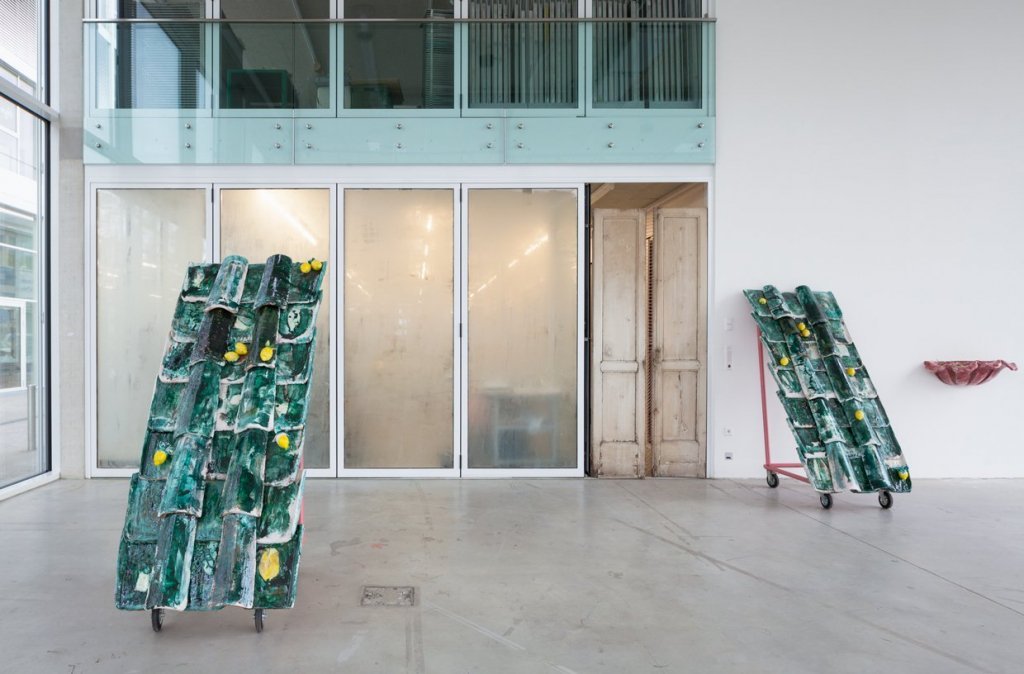
Raffaela Naldi Rossano’s artworks are relational vehicles of possibilities to be recombined. Part of the exhibition I confess at der TANK in Basel (2019), the work We are the Granddaughters of the Witches You Were Never Able to Burn consists of ceramic letters. They allude to a sense of community, as they are articulated around various objects and texts inspired by the slogans of a feminist protest in Switzerland in 2019.
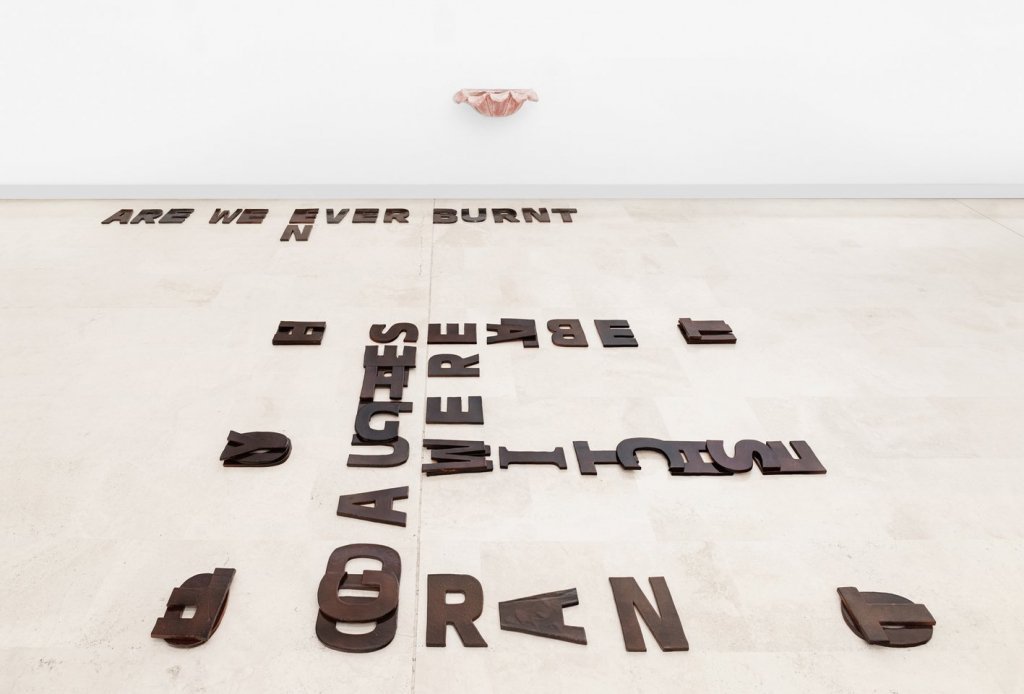
A year later, at the 2020 Quadriennale d’Arte in Rome curated by Stefano Collicelli Cagol and Sarah Cosulich, this textual work is transformed into We Never/Ever Able To Burn, which includes new typographic characters and symbols. This time the letters are frantically scattered on the floor as if they were possessed. They aim at a perennial invocation, which excludes the notions and concepts of a dominant culture, not only re-appropriating identities and materials but also prompting reformulations and transformations.
There are no new ideas still waiting in the wings to save us… There are only old and forgotten ones, new combinations, extrapolations and recognitions from within ourselves — along with the renewed courage to try them out. And we must constantly encourage ourselves and each other to attempt the heretical actions that our dreams imply, and so many of our old ideas disparage.
– Audre Lorde
Getting involved and summoning others in new relationships with the semantics of language can mean confusing power structures, evoking a political and spiritual confabulation based on gestures, stories, or the recovery and invention of symbols, bodies and objects. It is about invoking ancestral beings and entities.
Space and time, the most oppressive categories built by humanity, can be re-appropriated, rethought, re-edited as a way of renewal and invention. This is the role of ritual and mythology in the work of Raffaela Naldi Rossano. Genius loci and personal memory come together in the search for an alternative society or community: Partenope, one of the three sirens from Greek mythology, whose body is said to be the foundation of the city of Naples (the artist’s hometown) is transposed into an ongoing body of work.
Partenope (2019) is a resin sculpture of a coin with the image of the siren, referencing the monetary system of Western patriarchal societies. According to the myth, Partenope is a gender-fluid creature embodied in a powerful, rebellious and seductive woman who is considered a danger to society. This work suggests the artist’s approach to the notion of formation and transformation within communities and identities.
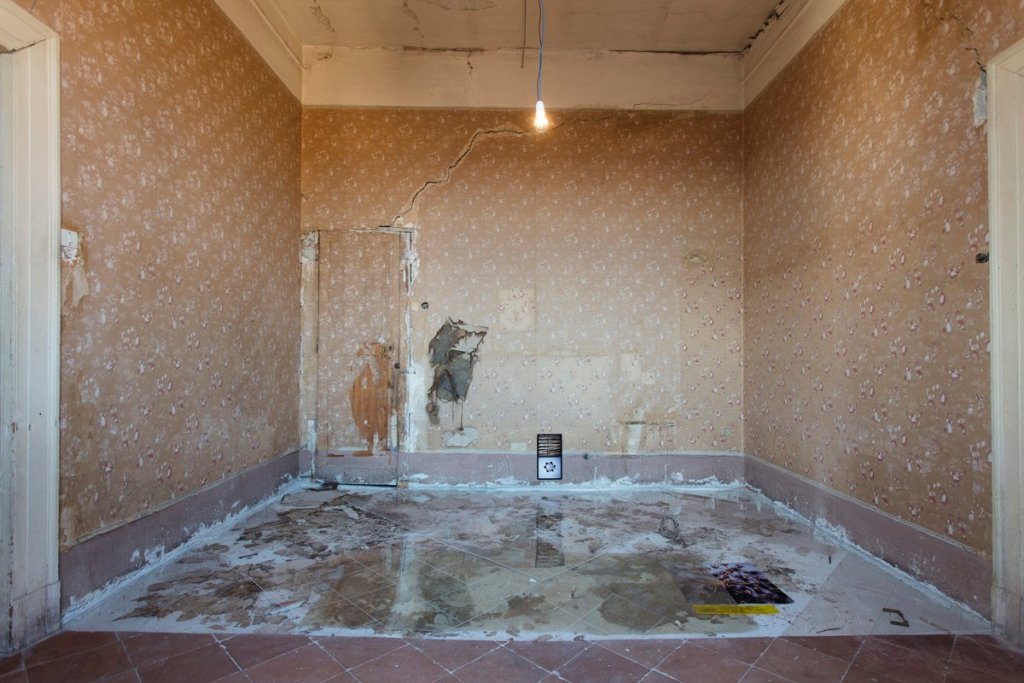
Addressing similar concerns, Raffaela Naldi Rossano founded Residency 80121 in Naples in 2017, a contemporary research platform where invited artists and theorists have played with the multi-layered and sedimented identity of the space: an apartment the artist inherited from her grandmother. Vision of Postery (2017) is a site-specific artwork by her at Residency 80121, which incorporates the materiality of subjective conditions within a formal set-up. Through this artwork, the environment becomes transitory, intimate, relational, and permeable. The transparent support reminds of the foil sheets used by Carla Accardi, whose process and subjectivity was seemingly revealed through the transparent material. As Giovanna Zapperi writes: “Accardi’s environments also raise the problem of a sexual subjectivity within a space that is marked by social separation yet open to trespassing.” [1]
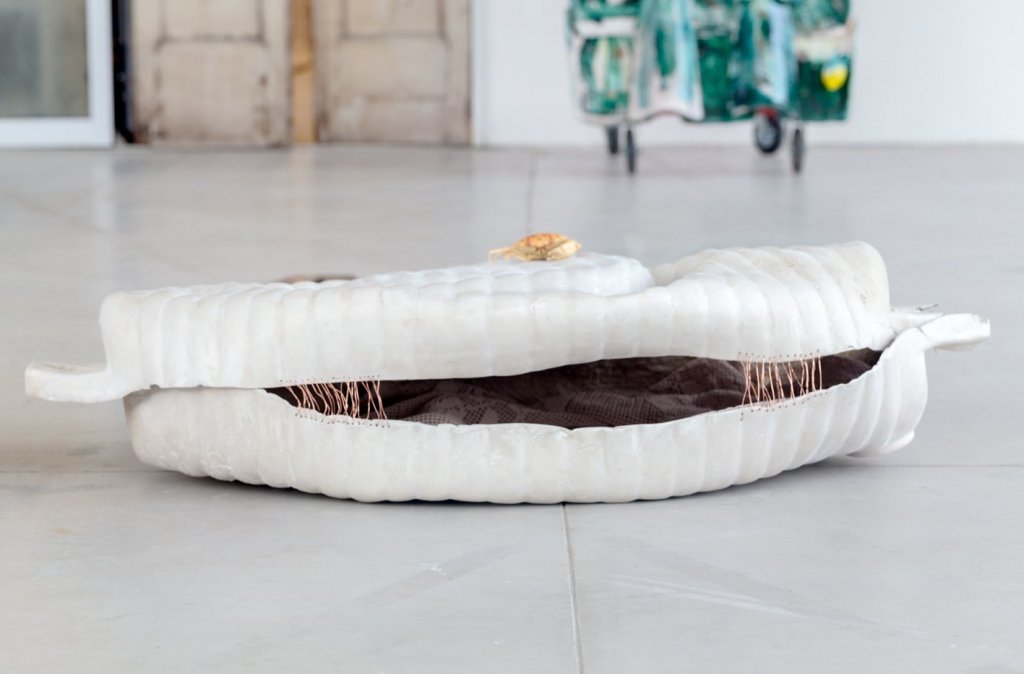
Raffaela Naldi Rossano takes us close to a radical breakdown of the architectural and domestic environment, a re-appropriation not only of space but also of the landscape, a poetic articulation of the territory. In her solo exhibition in Basel titled I confess curated by Chuz Martinez, the coastal landscape becomes part of a collisional plot with the domestic space. The works in the exhibition are elements of architecture, surface and contact structures, poised between exterior and interior, between public and private, between repair and transformation. Rubber casts of a coastline model including a beach and a series of buoys co-exist with a pergola roof, a window blind and three “beds of temporality.”
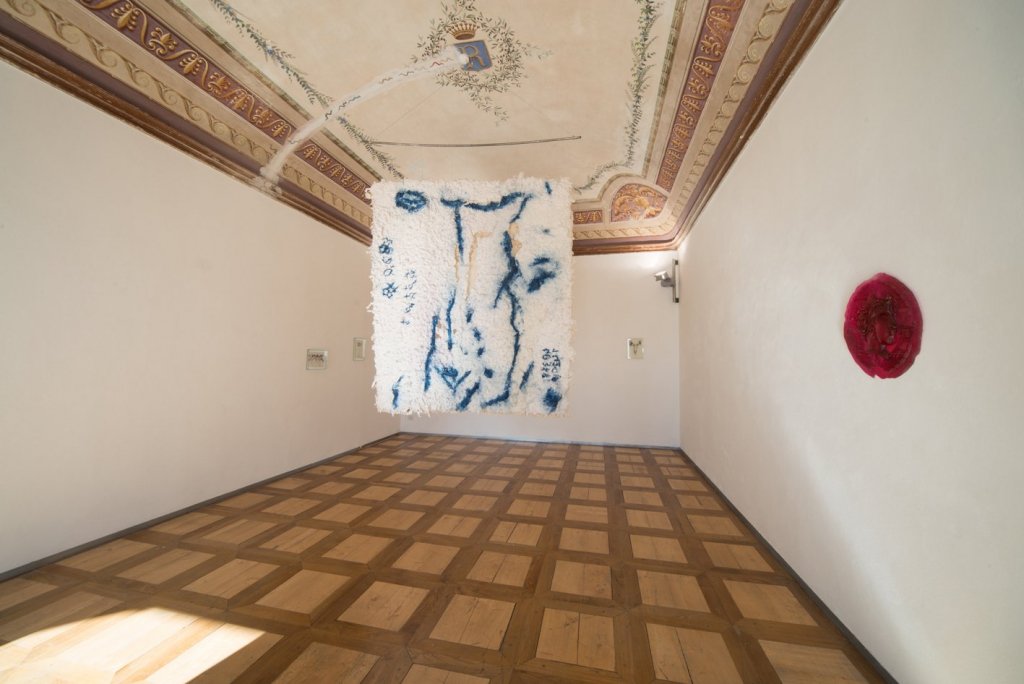
The works Transition I, II and III are transitory objects, whose material and symbolic status invite us to experiment with alternative ways of living in the world. Transition III, now exhibited at the Sandretto Re Rebaudengo Foundation in Guarene and originally part of the exhibition I confess, is made up of several layers. It includes different gestures and stories, articulated according to a new language, a new narrative, a new consistency of things: the rubber cast of a cliff, the place where mermaids live and die turning into rocks, is presented with the lace from a wedding trousseau. The description of the dowry is whispered phonetically with the voice and the words coming together in a bewitching and disturbing exercise.
Sound pieces often accompany Raffaela Naldi Rossano’s artworks. Some of them are close to the confessions by Kathy Acker in her work in kindness will save us, in their echoing the myth of the sirens and their voice, intertwined with intimate jolts. The private sphere bursts into the creative process with its ways of life and feeling, both psychical and corporeal, but also with its metamorphoses and its grafts, its interruptions and conjunctions.

On the surface, that is, the place of agreement, or the concave space in some of the works exhibited in Basel, we find ceramic and preserved lemons, as well as seams handmade by the artist. If seams are the cumbersome signs of personal and collective memories that crowd the objects and their functions – too often patriarchal – and which the artist seeks to appropriate, lemons are instead the symbol of an excessive condition. They strive to overcome a static epistemology to bring forward a certain aura through sensory perception – the preserved lemons emit a pungent fragrance.
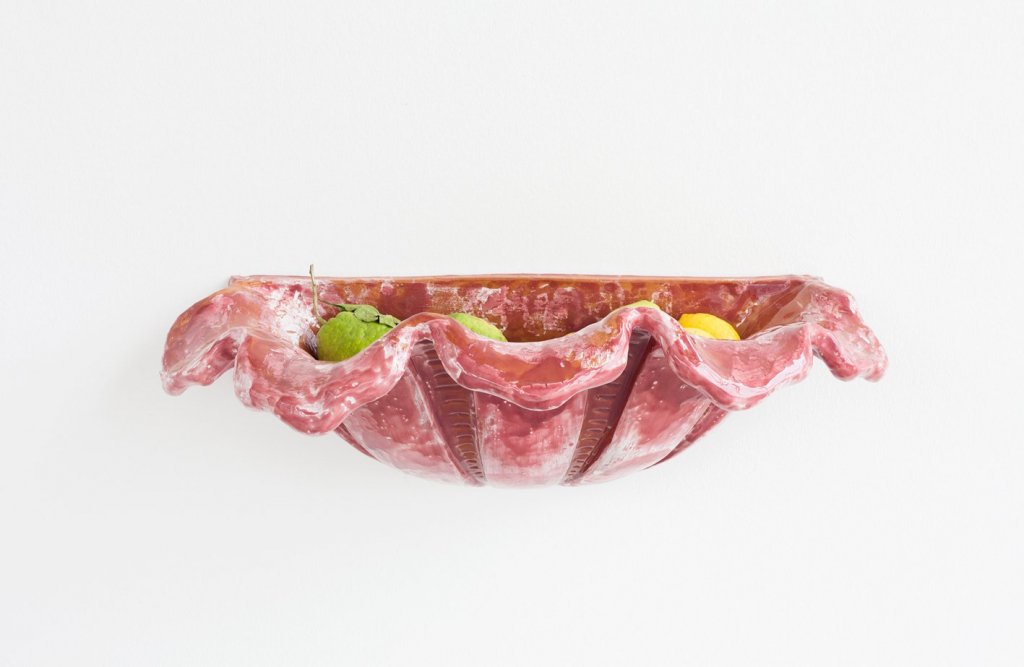
The distillation of these experiences is crystallized in Liquid Confession I, II and III, three ceramic stoups where touch and interiority hinge on the ability to feel “through others, a feel for feeling others feeling you.” [2] The stoup also refers to the fountain of Kastalia in Delphi, which Raffaela Naldi Rossano visited with two companions on a journey to the temples of female oracles, where the three women practiced a series of rituals together.
The drawings on salt-washed paper titled Sister’s Salvation: Alive Buried Sounds Alphabet from Ligea to Partenope in Hydra are the material sign of these rituals. They are the vision of what we have forgotten, that is, a primitive and remote language at the service of a non-linear narrative, dealing with other sirens (and priestesses) of the Greek mythological tradition. The drawings stand for an attempt at learning about oblivion, a prophecy intertwined with history and the landscape. According to Carla Lonzi, prophecy is not a prediction of the future, but awareness of what is not recognized or perceived.
Raffaela Naldi Rossano often uses blue and pink in her work. Her palette is not only a symbol of a binary secularization, it is also a sign for the sunrise and sunset, for the poetics of space that opens up to the landscape, and for a choral and polyphonic subjectivity that is ready to break in with its confabulations, myths and rites.
[1] G. Zapperi, Carla Lonzi, Un’arte della Vita, DeriveApprodi, Roma, 2017
[2] Cfr Hapticality in: S. Harney & F. Moten, The Undercommons, Fugitive Planning & Black Study, MinorComposition, NY, 2013
Bibliography
Giovanna Zapperi, Carla Lonzi, Un’arte della Vita, DeriveApprodi, Roma, 20017
Stefano Harney & Fred Moten, The Undercommons, Fugitive Planning & Black Study, MinorComposition, NY, 2013
Aure Lorde, Sister Outsider: Essays and Speeches. The Crossing Press Feminist Series. Trumansburg, NY: The Crossing Press, 1984.
Elisa Cuter, Ripartire Dal Desiderio, Minimum Fax, Roma, 2020
Silvia Federici, Caccia alle streghe, guerra alle donne, NeroEdition, 2020 Jean – Luc Nancy, Corpus, Cronopio Edizioni, Napoli, 2004
March 2, 2021
